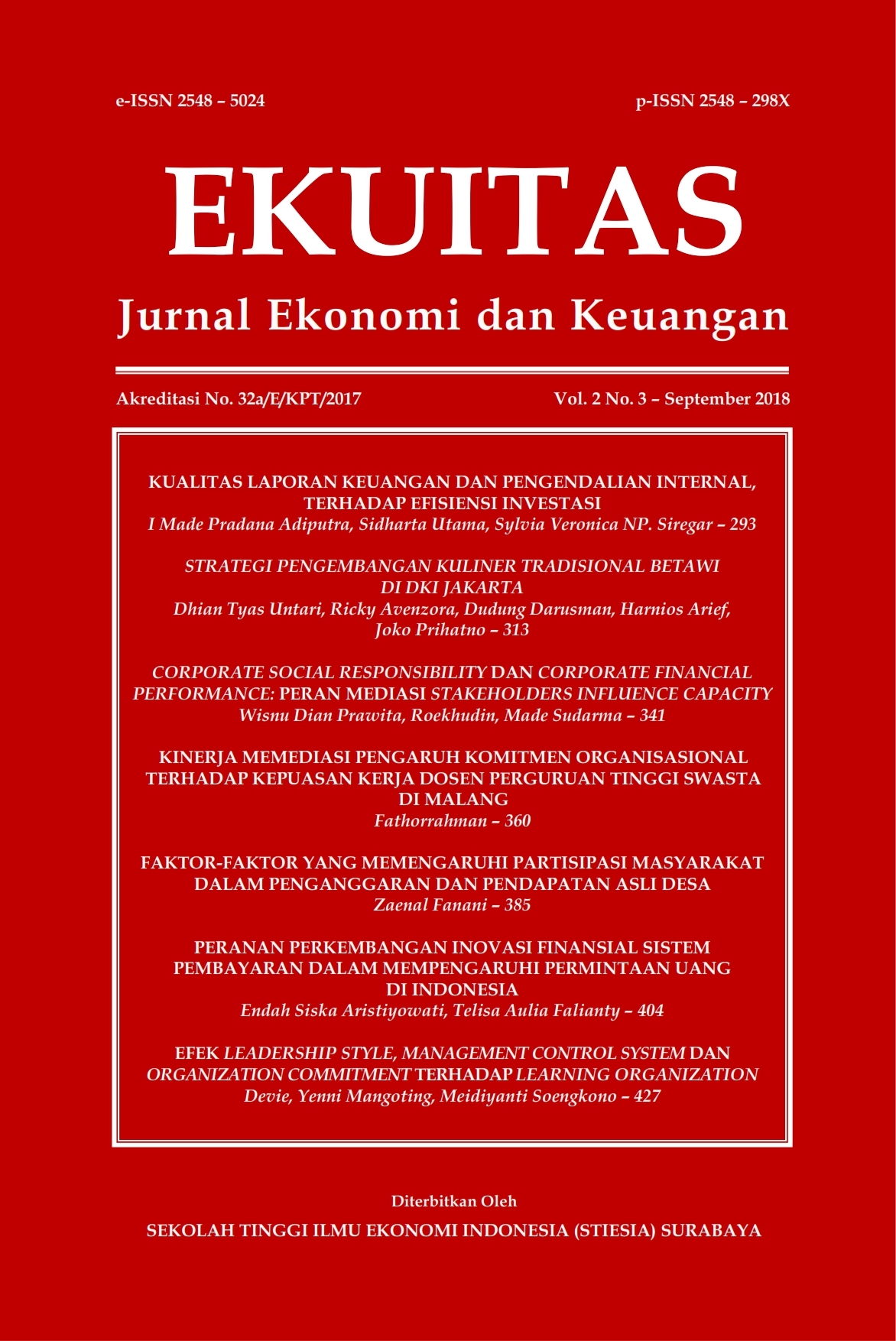STRATEGI PENGEMBANGAN KULINER TRADISIONAL BETAWI DI DKI JAKARTA
DOI:
https://doi.org/10.24034/j25485024.y2018.v2.i3.4011Keywords:
Betawi Culinary, Strategy, Jakarta, Pairwise compalingAbstract
Betawi is a reflection of the acculturation process of several tribes in Indonesia and even some nations in the world. But in fact, the existence of Betawi Culinary Culture is now starting eroded by the concept of modernization. Culinary is one of the cultural products of a society, as well as Betawi Culinary. Where now aday Betawi Culinary is not a superior culinary in Jakarta. Thus it is necessary to made a business revitalization strategy in developing traditional culinary (Betawi) in Jakarta. Thus in general purpose of the research is to build Betawi Culinary development strategy in Jakarta, so the Traditional Betawi Culinari, will clasified on 3 classification; Familiar Culinary, Recall Culinary and Past Known Culinary. Quantitaive Metode used; EFAS/IFAS matrix, Grand Matris and SWOT. Pairwise comparing and eigenfactor score used as a referral to giving equal weight on EFAS/ IFAS matrix. Result of the study show that cross-sectoral coordination, Strengthening the marketing system and increase the economic value of Betawi Culinary are needed to increasing the existence of culinary betawi in global market. The results expected to be reference for any relevant agencies in develomping traditional culinary as a culture product.
References
Avenzora, R., D. Darusman, J. Prihatno, dan D. T. Untari. 2014. The Business Potentials of Betawi Traditional Culinary on Traditional Culinary Ecotourism Market in the DKI Jakarta. Prosiding International Seminar of Tourism Bandung: 516-523.
Boyd, W. H., O. C. Walker, dan J. C. Larreche. 2000. Manajemen Pemasaran: Suatu Pen- dekatan Strategisdengan Orientasi Global. Erlangga.Jakarta.
David, F. 2005.Manajemen Strategik. Salemba Empat. Jakarta.
Jones, M. B., J. Finnan, T. R. Hodkinson. 2015. Morphological and Physiological Traits for Higher Biomass Production in Perennial Rhizomatous Grasses Grown on Marginal Land. GCB Bioenergy 7(2): 375–385.
Kastaman, R. 2003. Kajian Teknis Budidaya dan Manajeman Produksi Pengolahan Minyak Nilam di Beberapa Sentra Nilam Jawa Barat. Laporan Kegiatan Pengabdian Masyarakat Universitas Padjadjaran. Bandung.
Krisnansari, D. 2010. Nutrisi dan Gizi Buruk. Mandala of Health 4(1): 9-21.
Maberly, C. dan D. Reid. 2014. Gastronomy: an Approach to Study Food. Nutrition and Food Science 44(4): 272–278.
Mufidah, N. L. 2012. Pola Konsumsi Masyarakat Perkotaan (Studi Deskriptif Pemanfaatan Foodcourt). BioKultur 1(2): 157-178.
Ongkorahardjo, E. P. 2015. Formulasi Strategi Usaha Makanan Ringan Tradisional Ny. Gan Di Surabaya. Jurnal Agora 3(2): 665- 675.
O’Callaghan, C., C. D. Feliciantonio, dan M. Byrne. 2017. Governing Urban Vacancy in Post-Crash Dublin: Contested Pro- perty and Alternative Social Projects. Urban Geography 39(6): 868-891.
Parys, N. 2013. Cooking up a Culinary Identity for Belgium. Gastrolinguistics in Two Belgian Cookbooks (19th cen- tury). Appetite 71: 218–231.
Pisman, A., G. Allaert, dan P. Lombaerde. 2011. Urban and Suburban Lifestyles and Residential Preferences in a Highly Urbanized Society: Experiences from a Case Study in Ghent (Flanders, Belgi- um). Urban Studies in Belgium 1(2): 1-16.
Parami, J. 2006. Intercultural Jakarta, Ambi- ence of Betawi Theatre to Indonesian Theatre. Wacana Seni Journal (Arls Discourse) 5(1): 43-69.
Perry, M., C. Rosenzweig, A. Iglesias, M. Livermore, dan G. Fischer. 2004. Effects of Climate Changeon Global Food Production under SRES Emissionsand Socio-Economic Scenarios. Elsevire Global Envirinmental Change 14: 53–67.
Rais, S. A. 2004. Eksplorasi Plasma Nutfah Tanaman Pangan di Provinsi Kali- mantan Barat. Buletin Plasma Nutfah 10(1): 29-42.
Sabudi, I. N. S. 2011. Klasifikasi Makanan Tradisional Bali di Perhotelan.Jurnal Kepariwisataan Indonesia 10(2): 33-57.
Simelton, E., E. D. G. Fraser, Termansen, T. G. Benton, S. N. Gosling, A. South, dan P. Forster. 2012. The Socioeconomics of Food Crop Production and Climate Change Vulnerability: A Global Scale Quantitative Analysis of How Grain Crops are Sensitive to Drought. Food Security 4(2): 163–179.
Saputra, B., R. Linda, dan I. Loviadi. 2015. Jamur Mikoriza Vesikular Arbuskular (MVA) pada Tiga Jenis Tanah Rhizosfer Tanaman Pisang Nipah (Musa ParadisiacalL.Var.Nipah) di Kabupaten Pontianak. Jurnal Protobiont 4(1): 160–169.
Tjiptono. 2008. Pemasaran Startegi. ANDI. Jokjakarta.
Untari, D. T. 2016. The Potential Development of Betawi Culinary as an Ecotourism Product in Jakarta. Binus Business Review 7(3): 277-282.
Untari, D. T. dan B. Satria. 2014. Strategi Pemasaran “Laksa Tangerang” Sebagai Salah Satu Produk Wisata Kuliner di Tangerang. Jurnal Manajemen 10(2): 49-64.
Untari, D. T., R. Avenzora, D. Darusman, dan J. Prihatno. 2017a. Betawi Culinary; Sosio-Cultures Frame Of Multi Communities In Jakarta. Advance Science Letters 23(9): 8519-8523.
Untari, D. T., R. Avenzora, D. Darusman, J. Prihatno, dan H. Aries. 2017b. Betawi Traditional Cuisines; Reflection the Native Culture of Jakarta (Formerly Known as Batavia). Journal of Economic Development, Environment and People 6(4): 63-76.














